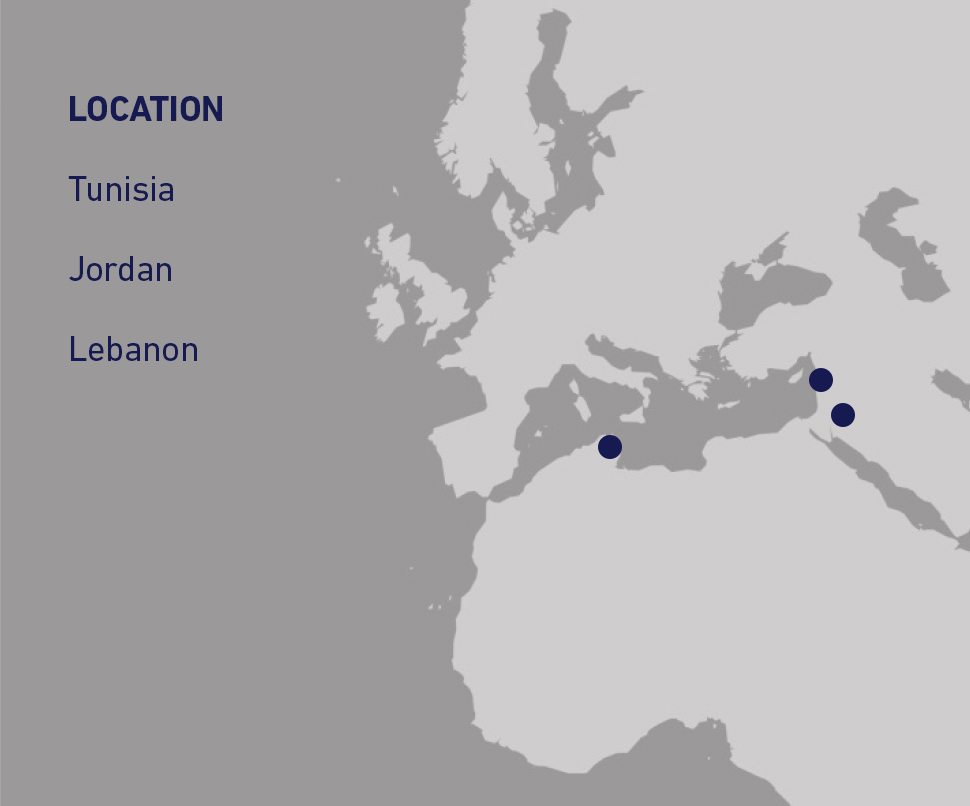
SEARChED – Strengthening Employment and entrepreneurial Activities to Recover COVID-19 Epidemic Damages
Context and objectives
The SEARChED project aims to promote the economic growth of enterprises and improve the business environment by developing resources and services for MSMEs, focusing on the agri-food sector in Tunisia and Jordan, and the energy efficiency sector in Lebanon. It will also provide capacity-building, coaching and training programmes for unemployed people to strengthen their skills. There will be a specific focus on including women and women-owned businesses.
The project targets sectors that are fundamental to enhancing the resilience in the face of climate change, water scarcity, food insecurity and migration – issues that have been exacerbated by the pandemic and deeply affect the most vulnerable.
Tunisia and Jordan face conditions of water scarcity and increasing domestic demand for water is reducing the water allocated for agriculture. Water protection is therefore a priority in order to increase agricultural productivity. Other challenges include low competitiveness due to low level of technical knowledge, insufficient diffusion of modern production, scarce level of aggregation for adequate access to markets, lack of innovation and technical support, and difficult access to financial support.
In Lebanon, there is an unsatisfied demand for electricity, high generation costs, and a lack of financial sustainability for private sector growth. Energy supply is almost totally dependent on imported oil, and renewable energy sources remain underexploited. Reducing energy generation and consumption costs is key to allow Lebanese enterprises to become more competitive.
Location

Key figures
Duration:
8 months
Countries:
3
Total cost:
€503,416.81
Key partners
National Agricultural Research Center (NARC)
Beneficiaries
- Local technical institutions and MSMEs in the agro-food sector (Tunisia and Jordan).
- Energy Service Companies (ESCOs), renewable energy/energy efficiency technology providers and SMEs in the energy efficiency sector (Lebanon).
- 81 young people who are graduated or are enrolled in relevant postgraduate courses.
- 40 young people and/or farmers from rural areas in Tunisia and Jordan who want to start or expand an entrepreneurial activity.
- Family members of entrepreneurs, their employees or new young professionals.
- Rural populations in Tunisia and Jordan.
Key actions
In the agricultural sector in Tunisia and Jordan:
Testing and demonstration of efficient and eco-friendly water management systems.
Training to enhance technical, administrative and commercial capabilities of agri-food MSMEs or Associations of MSMEs.
Coaching to access financial opportunities and public incentives to increase productivity, enter new markets and generate employment.
Plans for the promotion of agri-food products and access to Italian markets.
In the energy efficiency sector in Lebanon:
Awareness raising campaign on the advantages of sustainable energy and existing financing opportunities.
Feasibility studies on different business models and energy performance contracts; capacity-building programmes to strengthen financial, technical and contractual know-how.
Energy audits, intervention plans and energy savings monitoring; technical assistance to access sustainable energy finance.
Roadmap to promote ESCO business growth and the sustainable energy transition of the Lebanese economy.
Expected results
Unemployed people have the skills to create and manage new businesses in the agro-food sector: they are informed and oriented on entrepreneur opportunities, supported in the development business plans and trained in basic technical and management skills, agricultural production and techniques, business development, processing and marketing, water-efficient and energy-saving solutions and technologies related to the agricultural/agri-food sector.
MSMEs in Tunisia, Lebanon and Jordan in the agriculture and energy efficiency sectors are more efficient and effective in their markets.

